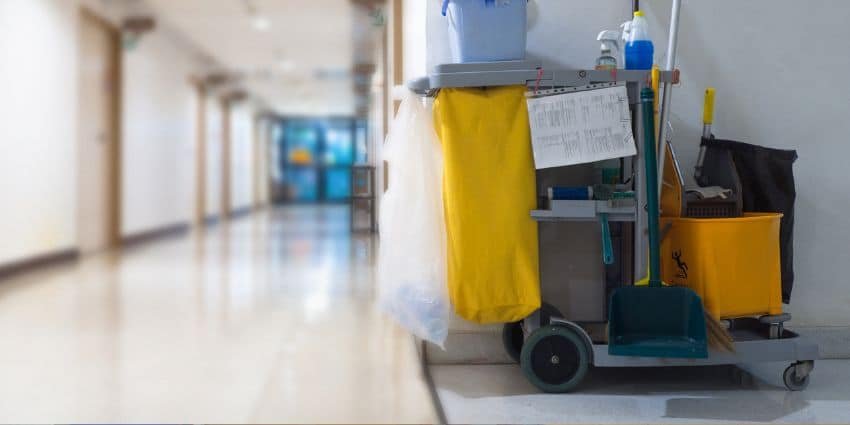Maintaining the safety and well-being of patients and personnel depends on the particular set of difficulties cleaning and maintaining healthcare facilities poses. The stakes are great given strict hygienic standards and the possibility of healthcare-associated infections (HAIs.). This blog post will go over the nuances of hospital cleaning, the critical need of specific tools and disinfectants, and the advantages of working with a professional cleaning company.
Contents
- The special difficulties in maintaining healthcare facilities
- The Value of Strong Hygiene Standards in Medical Environment
- The Part Disinfectants and Specialized Cleaning Equipment Play in
- How Effective Cleaning Affects Staff and Patient Safety
- The advantages of working with a specialist healthcare cleaning company
- Healthcare Cleaning Industry Regulations and Compliance Guidelines
The special difficulties in maintaining healthcare facilities
Because of their great danger of infection and the presence of biohazards, healthcare facilities—including hospitals, clinics, and medical offices—demand exacting cleaning standards. Unlike other commercial venues, these ones house sensitive people whose health can be harmed by poor cleaning.
Challenges include:
- Healthcare facilities have a high risk of epidemics of healthcare-associated illnesses (HAIs), which can be passed on surfaces, tools, or via airborne particles. To reduce these hazards, cleaning processes have to be strong and conducted completely.
- Medical waste and biohazards that call for particular treatment and disposal techniques are two items that facilities sometimes deal with. Bad disposal might cause health risks and contamination.
- Complex Environments: High-touch surfaces, specialized equipment, and sensitive sections like operating rooms, all of which necessitate particular cleaning procedures, often form part of the layout and purpose of healthcare facilities.
The Value of Strong Hygiene Standards in Medical Environment
Maintaining a sterile surroundings and avoiding diseases depend on strict hygienic standards. Healthcare environments have to follow strict guidelines in order to guard staff members, guests, and patients from possible hazards.
Key hygiene practices comprise:
- High-touch surfaces such door handles, light switches, and medical equipment call for regular cleaning. This lowers the cross-contaminational danger.
- In key places like operating rooms, sterilizing medical tools and surfaces is essential to stop the spread of infections.
- Reducing the risk of infection transfer depends on staff members adhering strictly to hand hygiene standards.
The Part Disinfectants and Specialized Cleaning Equipment Play in
Good healthcare cleaning calls for more than just basic tools. Ensuring complete cleaning and infection control depends much on specialized equipment and disinfectants.
Specialized tools comprise:
- Using ultraviolet light– this method kills germs and bacteria on surfaces and in the air. Sensitive settings and hard-to-reach locations especially benefit from it.
- By capturing small particles and allergens, High-Efficiency Particulate Air (HEPA) Vacuums aid to maintain good indoor air quality and slow down the pathogen transmission.
- Automated cleaning systems Particularly in very busy locations, robotic and automated systems can provide constant and effective cleaning.
Disinfectants and cleaning products:
- Hospital-grade disinfectants: These are meant to kill a variety of germs, including those resistant to popular disinfectants. In high risk environments, they are absolutely crucial.
- Antimicrobial cleaners : These offer extra layer of protection and assist stop the spread of fungus and bacteria on surfaces.
How Effective Cleaning Affects Staff and Patient Safety
In healthcare environments, correct cleaning significantly affects the safety of staff members as well as patients. It shapes general facility safety, recuperation times, and infection rates directly.
Benefits include:
- Better patient outcomes and shorter hospital stays follow from effective cleaning and disinfection techniques helping to limit the spread of HAIs.
- Improved staff safety, A clean surroundings lower the possibility of staff members coming into contact with dangerous biohazards and germs, thereby promoting a better and more efficient workforce.
- Enhanced Client Content, Patient satisfaction is strongly influenced by cleanliness. A well-kept surroundings promotes confidence and care, which can help to affect the patient experience.
The advantages of working with a specialist healthcare cleaning company
Although in-house cleaning teams can take care of general cleaning chores, specialized healthcare cleaning services provide knowledge and sophisticated solutions catered to the particular requirements of medical institutions.
Benefits include:
- Specialized services trained in the most current infection control techniques and conversant with the particular requirements of healthcare environments reflect expertise in infection control.
- Professional cleaning services are well-versed in industry rules and compliance standards, thereby assuring that all cleaning operations satisfy legal and safety criteria.
- Often with thorough checklists and quality control procedures to guarantee standards are fulfilled, these services provide dependable and consistent cleaning, consistency and reliance.
- Modern cleaning technologies and supplies available to specialized services improve the efficacy of cleaning and disinfection procedures.
Healthcare Cleaning Industry Regulations and Compliance Guidelines
Maintaining a safe and efficient healthcare environment requires constant industry regulation compliance. Important rules and norms comprise:
- The Centers for Disease Control and Prevention (CDC) offers thorough recommendations for infection control and disinfection in medical environments.
- The Occupational Safety and Health Administration (OSHA) sets guidelines for handling and disposal of biohazardous materials as well as for general workplace safety.
- The Joint Commission Standards this body certifies medical facilities so they follow strict guidelines for infection control and hygiene.
- Environmental Protection Agency (EPA) To guarantee they are safe and effective, the EPA controls cleaning products and disinfectants applied in healthcare environments.
Cleaning medical facilities entails negotiating particular difficulties that call for strict hygienic standards, specific tools, and industry compliance. Good cleaning affects not only staff and patient safety but also helps to ensure the general efficiency of healthcare delivery.
Working with a specialized healthcare cleaning company has many advantages, including regular adherence to compliance criteria, innovative cleaning technologies, and expert expertise. Healthcare institutions may guarantee a safer, healthier surroundings for everyone they treat by giving careful cleaning and disinfection techniques first priority.
Don’t risk patient health. Keep Your Facility Safe with Professional Cleaning Services Call ProCleanings on (888) 906-9776


